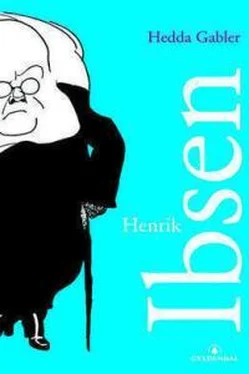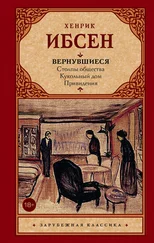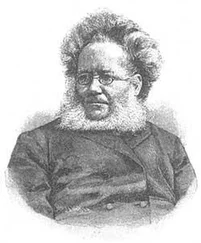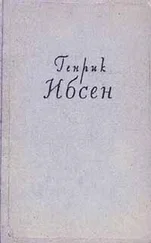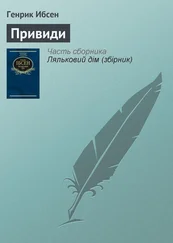MRS. ELVSTED.
I really went as governess. But his wife—his late wife—was an invalid,—and rarely left her room. So I had to look after the housekeeping as well.
HEDDA.
And then—at last—you became mistress of the house.
MRS. ELVSTED.
[Sadly.] Yes, I did.
HEDDA.
Let me see—about how long ago was that?
MRS. ELVSTED.
My marriage?
HEDDA.
Yes.
MRS. ELVSTED.
Five years ago.
HEDDA.
To be sure; it must be that.
MRS. ELVSTED.
Oh those five years—! Or at all events the last two or three of them! Oh, if you [11] Mrs. Elvsted here uses the formal pronoun De , whereupon Hedda rebukes her. In her next speech Mrs. Elvsted says du .
could only imagine—
HEDDA.
[Giving her a little slap on the hand.] De? Fie, Thea!
MRS. ELVSTED.
Yes, yes, I will try—. Well, if—you could only imagine and understand—
HEDDA.
[Lightly.] Eilert Lovborg has been in your neighbourhood about three years, hasn't he?
MRS. ELVSTED.
[Looks at here doubtfully.] Eilert Lovborg? Yes—he has.
HEDDA.
Had you known him before, in town here?
MRS. ELVSTED.
Scarcely at all. I mean—I knew him by name of course.
HEDDA.
But you saw a good deal of him in the country?
MRS. ELVSTED.
Yes, he came to us every day. You see, he gave the children lessons; for in the long run I couldn't manage it all myself.
HEDDA.
No, that's clear.—And your husband—? I suppose he is often away from home?
MRS. ELVSTED.
Yes. Being sheriff, you know, he has to travel about a good deal in his district.
HEDDA.
[Leaning against the arm of the chair.] Thea—my poor, sweet Thea—now you must tell me everything—exactly as it stands.
MRS. ELVSTED.
Well, then you must question me.
HEDDA.
What sort of a man is your husband, Thea? I mean—you know—in everyday life. Is he kind to you?
MRS. ELVSTED.
[Evasively.] I am sure he means well in everything.
HEDDA.
I should think he must be altogether too old for you. There is at least twenty years' difference between you, is there not?
MRS. ELVSTED.
[Irritably.] Yes, that is true, too. Everything about him is repellent to me! We have not a thought in common. We have no single point of sympathy—he and I.
HEDDA.
But is he not fond of you all the same? In his own way?
MRS. ELVSTED.
Oh I really don't know. I think he regards me simply as a useful property. And then it doesn't cost much to keep me. I am not expensive.
HEDDA.
That is stupid of you.
MRS. ELVSTED.
[Shakes her head.] It cannot be otherwise—not with him. I don't think he really cares for any one but himself—and perhaps a little for the children.
HEDDA.
And for Eilert Lovborg, Thea?
MRS. ELVSTED.
[Looking at her.] For Eilert Lovborg? What puts that into your head?
HEDDA.
Well, my dear—I should say, when he sends you after him all the way to town— [Smiling almost imperceptibly.] And besides, you said so yourself, to Tesman.
MRS. ELVSTED.
[With a little nervous twitch.] Did I? Yes, I suppose I did. [Vehemently, but not loudly.] No—I may just as well make a clean breast of it at once! For it must all come out in any case.
HEDDA.
Why, my dear Thea—?
MRS. ELVSTED.
Well, to make a long story short: My husband did not know that I was coming.
HEDDA.
What! Your husband didn't know it!
MRS. ELVSTED.
No, of course not. For that matter, he was away from home himself— he was travelling. Oh, I could bear it no longer, Hedda! I couldn't indeed—so utterly alone as I should have been in future.
HEDDA.
Well? And then?
MRS. ELVSTED.
So I put together some of my things—what I needed most—as quietly as possible. And then I left the house.
HEDDA.
Without a word?
MRS. ELVSTED.
Yes—and took the train to town.
HEDDA.
Why, my dear, good Thea—to think of you daring to do it!
MRS. ELVSTED.
[Rises and moves about the room.] What else could I possibly do?
HEDDA.
But what do you think your husband will say when you go home again?
MRS. ELVSTED.
[At the table, looks at her.] Back to him?
HEDDA.
Of course.
MRS. ELVSTED.
I shall never go back to him again.
HEDDA.
[Rising and going towards her.] Then you have left your home—for good and all?
MRS. ELVSTED.
Yes. There was nothing else to be done.
HEDDA.
But then—to take flight so openly.
MRS. ELVSTED.
Oh, it's impossible to keep things of that sort secret.
HEDDA.
But what do you think people will say of you, Thea?
MRS. ELVSTED.
They may say what they like, for aught I care. [Seats herself wearily and sadly on the sofa.] I have done nothing but what I had to do.
HEDDA.
[After a short silence.] And what are your plans now? What do you think of doing.
MRS. ELVSTED.
I don't know yet. I only know this, that I must live here, where Eilert Lovborg is—if I am to live at all.
HEDDA.
[Takes a chair from the table, seats herself beside her, and strokes her hands.] My dear Thea—how did this—this friendship—between you and Eilert Lovborg come about?
MRS. ELVSTED.
Oh it grew up gradually. I gained a sort of influence over him.
HEDDA.
Indeed?
MRS. ELVSTED.
He gave up his old habits. Not because I asked him to, for I never dared do that. But of course he saw how repulsive they were to me; and so he dropped them.
HEDDA.
[Concealing an involuntary smile of scorn.] Then you have reclaimed him—as the saying goes—my little Thea.
MRS. ELVSTED.
So he says himself, at any rate. And he, on his side, has made a real human being of me—taught me to think, and to understand so many things.
HEDDA.
Did he give you lessons too, then?
MRS. ELVSTED.
No, not exactly lessons. But he talked to me—talked about such an infinity of things. And then came the lovely, happy time when I began to share in his work—when he allowed me to help him!
HEDDA.
Oh he did, did he?
MRS. ELVSTED.
Yes! He never wrote anything without my assistance.
HEDDA.
You were two good comrades, in fact?
MRS. ELVSTED.
[Eagerly.] Comrades! Yes, fancy, Hedda—that is the very word he used!—Oh, I ought to feel perfectly happy; and yet I cannot; for I don't know how long it will last.
HEDDA.
Are you no surer of him than that?
MRS. ELVSTED.
[Gloomily.] A woman's shadow stands between Eilert Lovborg and me.
HEDDA.
[Looks at her anxiously.] Who can that be?
MRS. ELVSTED.
I don't know. Some one he knew in his—in his past. Some one he has never been able wholly to forget.
HEDDA.
What has he told you—about this?
MRS. ELVSTED.
He has only once—quite vaguely—alluded to it.
HEDDA.
Well! And what did he say?
MRS. ELVSTED.
He said that when they parted, she threatened to shoot him with a pistol.
HEDDA.
[With cold composure.] Oh nonsense! No one does that sort of thing here.
MRS. ELVSTED.
No. And that is why I think it must have been that red–haired singing–woman whom he once—
HEDDA.
Yes, very likely.
MRS. ELVSTED.
For I remember they used to say of her that she carried loaded firearms.
HEDDA.
Oh—then of course it must have been she.
MRS. ELVSTED.
[Wringing her hands.] And now just fancy, Hedda—I hear that this singing–woman—that she is in town again! Oh, I don't know what to do—
HEDDA.
[Glancing towards the inner room.] Hush! Here comes Tesman. [Rises and whispers.] Thea—all this must remain between you and me.
Читать дальше
